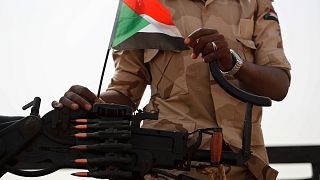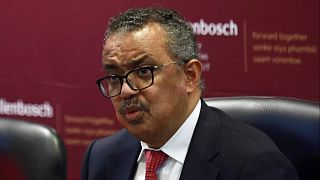Sudan
Sudan said it reopened its airspace Wednesday after an armed revolt from within its security forces shut down the capital’s airport for hours and left at least two people dead.
In a press conference, Gen. Abdel-Fattah Burhan, head of the country’s ruling transitional council, announced that “life has returned to normal,” following a tense stand-off between the armed forces and rogue intelligence officers. The officers had fired shots in the air to demand better severance benefits.
Sudan’s petroleum minister declared the resumption of oil production at two fields that had been seized by rebellious officers.
The airport authority in neighboring Egypt said it was resuming all flights to Sudan, following a two-day suspension over security concerns.
The burst of unrest had paralyzed street life in several parts of the capital, Khartoum, along with another western city. Videos circulated on social media showing vast deployment of security forces and heavy exchanges of gunfire.
The armed forces will “not allow any coup to occur,” said Burhan, adding that it was a “shame that weapons were raised in the faces of the people.”
The army quickly quelled the short-lived mutiny with “minimal losses,” said General Mohamed Othman al-Hussein, its chief of staff on Wednesday. The clashes killed two people and injured four others, including two officers, he added.
The doctors’ union reported that a father and his two children were killed when an errant artillery shell struck their home in a Khartoum suburb. The father was killed instantly, it said, and his 19-year-old daughter and 25-year-old son died on the way to the hospital. The different death tolls could not immediately be reconciled.
After trying to persuade the renegade officers to turn over their arms, the military stormed and retook the headquarters of an intelligence agency “using the least amount of force possible,” al-Hussein said.
The mutiny was the latest twist in Sudan’s fragile democratic transition after three decades of authoritarian rule under former President Omar al-Bashir. A sweeping protest movement ousted al-Bashir in April and led to the creation of a joint military-civilian government last summer.
During the transitional period, Sudan is devising ways to reorganize its armed forces. The program, al-Hussein said, requires dismantling an intelligence agency branch and merging it with a paramilitary unit known as the Rapid Support Forces, notorious for their brutal suppression of insurgencies in Sudan’s restive provinces.
Unrest ensued as angry intelligence officers, who were dismissed without receiving what they considered fair compensation, took to the streets.
Sudanese Prime Minister Abdallah Hamdok described the mutiny as “discord” aimed at “cutting off the nation’s transition to building a solid democracy.”
The disturbance, revealing simmering tensions within Sudan’s security apparatus, poses a tough test for the newly formed government’s democratic and economic goals.
“Sudan needs to figure out how to dismantle the deep state’s security forces and deal with their members,” said Cairo-based political analyst Saeed Sadek. “They are powerful, capable of creating civil war and subverting the transition.”
AP













01:05
Ethiopia's mega-dam on the Nile is "now complete", Prime Minister says
01:09
Sudan: RSF paramilitaries and allies declare parallel government
01:49
Sudanese refugees in Chad face deepening humanitarian crisis
01:41
UN warns of looming famine in Sudan, Gaza and 3 other global hunger hotspots
01:49
UN warns of impact Sudan's humanitarian crisis is having on Chad
Go to video
Sudan: Hamdok not convinced by the new Prime Minister